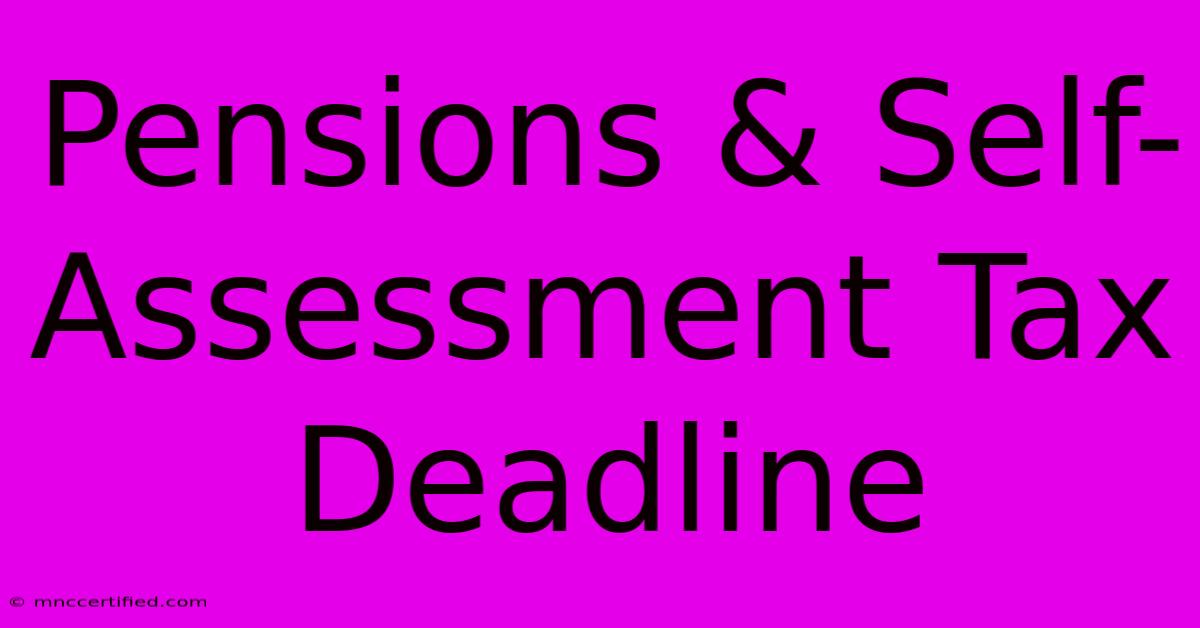Pensions & Self-Assessment Tax Deadline

Table of Contents
Pensions & Self-Assessment Tax Deadline: A Complete Guide
The self-assessment tax deadline looms, and for many, understanding how pensions impact your tax return can be confusing. This comprehensive guide clarifies the relationship between your pension contributions and your self-assessment, helping you navigate the process with confidence and avoid penalties.
Understanding the Self-Assessment Tax Return
The UK's self-assessment system requires individuals and businesses to declare their income and calculate their tax liability annually. The deadline is typically January 31st, and failing to submit on time can result in significant penalties. Key elements included in your self-assessment are:
- Income: This encompasses various sources, including employment income, self-employment profits, rental income, and investment income.
- Allowable Deductions: You can reduce your taxable income by claiming various deductions, including pension contributions.
- Taxable Income: This is your income after deducting allowable expenses and allowances.
- Tax Liability: This is the amount of tax you owe based on your taxable income and the applicable tax bands.
Pensions and Tax Relief: Your Key to Savings
Pension contributions offer a significant tax advantage. The government encourages saving for retirement by providing tax relief on contributions. This means you effectively get money back from the government for the money you contribute to your pension. There are different ways this relief is applied:
Basic Rate Tax Relief:
- This is automatically applied by your pension provider. If you're a basic-rate taxpayer (20%), the government adds 20% to your contributions. For example, if you contribute £100, your provider will add £20, making your total contribution £120.
Higher & Additional Rate Tax Relief:
- Higher-rate (40%) and additional-rate (45%) taxpayers can claim additional relief through their self-assessment tax return. This is because the basic rate relief doesn't cover the full amount they're entitled to. You'll need to include the details of your pension contributions in your self-assessment to claim this additional relief.
Calculating Your Relief:
The amount of tax relief you receive depends on your contribution level and your tax rate. It's crucial to keep accurate records of all pension contributions made throughout the tax year (6th April to 5th April).
How to Report Pension Contributions on Your Self-Assessment
When completing your self-assessment, you'll need to accurately report your pension contributions. This usually involves:
- SA100 Form: This is the main self-assessment form where you declare your income and expenses. You'll find sections dedicated to pension contributions.
- Supporting Documentation: Keep all your pension contribution statements and other relevant documentation as proof. HMRC may request this information if there's any query.
- Accuracy is Crucial: Ensure you provide the correct amounts and dates for each contribution to avoid delays or penalties. Mistakes can lead to delays in processing your tax return and potential underpayment penalties.
Missing the Deadline: Penalties & Consequences
Missing the January 31st deadline for your self-assessment return can lead to significant penalties. These penalties increase the longer you delay, impacting your finances considerably. It's always best to submit your return on time, or at least apply for an extension if genuinely needed.
Planning Ahead for Next Year
To avoid last-minute stress and potential penalties, start planning your self-assessment well in advance.
- Keep Accurate Records: Maintain detailed records of all income and expenses throughout the tax year.
- Understand Your Tax Liabilities: Familiarize yourself with your tax obligations and how pension contributions affect your tax return.
- Use Tax Software: Consider using tax software or seeking professional advice to help you complete your self-assessment accurately and efficiently.
Conclusion: Pensions and Self-Assessment – A Powerful Combination
Understanding how pensions impact your self-assessment tax return is key to maximizing your tax savings and ensuring you comply with HMRC regulations. By accurately reporting your pension contributions and submitting your return on time, you can secure your tax relief and avoid potential penalties. Remember, proactive planning and accurate record-keeping are essential for a smooth and successful self-assessment process. If unsure, seek professional advice from a tax advisor or accountant.

Thank you for visiting our website wich cover about Pensions & Self-Assessment Tax Deadline. We hope the information provided has been useful to you. Feel free to contact us if you have any questions or need further assistance. See you next time and dont miss to bookmark.
Featured Posts
-
Whats App Instagram Facebook Down Meta
Dec 12, 2024
-
Dhs Releases Info On Mystery Drones
Dec 12, 2024
-
Rep Mace Wears Sling At Capitol
Dec 12, 2024
-
New Jersey Residents Report Drones
Dec 12, 2024
-
East Coast Storm Ski Resort Chaos
Dec 12, 2024